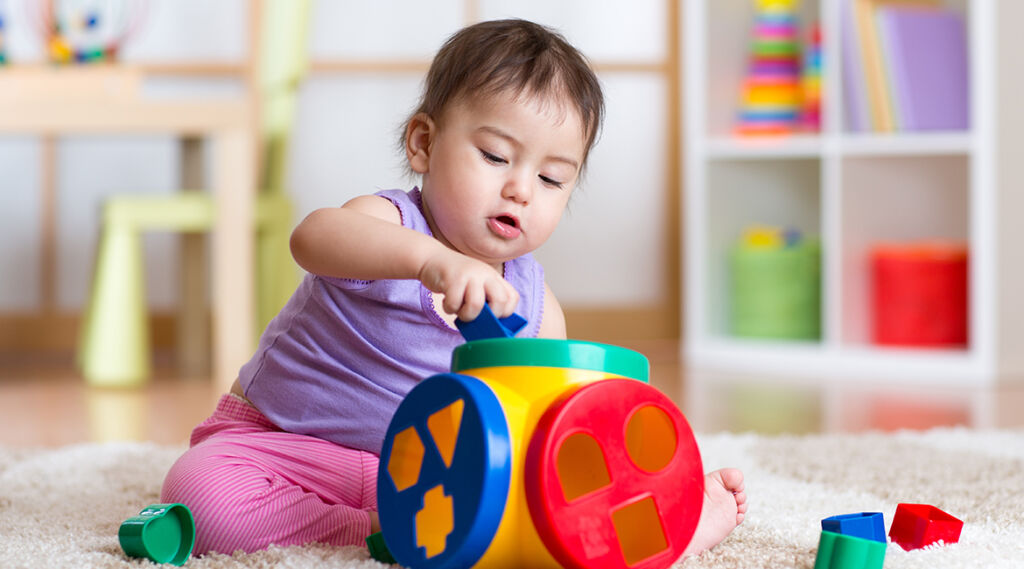What Are Fine Motor Skills?
“Fine Motor Skills” refers to the ability to control and coordinate small muscle groups. Simply put, fine motor skills are all about using your hands and fingers to complete tasks. Fine motor skills require your child to make precise movements. These involve the hand control that enable children to engage in detailed activities.
The development of fine motor skills typically begins in infancy. Babies start to explore and interact with objects around them by using their hands and fingers. Over time, babies and toddlers refine their movements. Babies will first grasp objects with their whole hand; but as they grow, babies develop more precise muscle control. An example of this is using their thumb and fingers to grab their favorite things. This development is known as the Pincer Move. Fine motor skills continue to develop throughout childhood and into adolescence, improving with practice and experience.
Examples of Fine Motor Skills
Babies and children express an understanding of fine motor skills in many ways. From an early age, they grab things that delight them with an open hand closing into a clumsy but effective fist. Grasping an object is a small fine motor skills victory. As the baby’s muscles develop and their coordination improves, they will begin coloring with crayons and using small rudimentary utensils such as a toddler spoon. Other examples of early fine motor skills include building with stacking toys and playing toy instruments.
As children get older, their small muscle groups develop, coordination improves, and skills become more complex.
Writing: preschool children begin showing their fine motor skill mastery when they write with a pencil; they begin with shapes, letters, and numbers
- Building/Stacking: toddlers have natural inclination to create tall towers and big buildings
- Cutting: older toddlers and preschoolers begin using safety scissors to cut lines or shapes in paper
- Buttoning: when a small child can complete very precise motions, they begin to button their own clothing
- Zipping: much like buttoning, zipping is a fine motor skill that is mastered when children have better eye hand coordination and leads to independence
- Threading: School aged children begin arts and crafts, and many include placing beads and uncooked noodles on a strong or elastic
- Typing: learning in the 21st century means digital interaction, and mastering a keyboard occurs at a younger and younger age
- Playing Musical Instruments: Pressing piano keys, strumming guitar strings, and tapping drumsticks all require intricate finger and hand movements
Why are Fine Motor Skills Important?
The development of fine motor skills in young children is essential for their physical, cognitive, social, and emotional growth, laying the groundwork for success in various aspects of life.
Practicing fine motor skills enhances physical coordination and strengthens hands and fingers. This in turn helps children complete tasks that require more strength in their hands.
Fine motor skills are directly linked to academic readiness. Children need well-developed fine motor skills to effectively handle writing utensils, manipulate small objects in science experiments, and engage in other classroom activities.
Fine motor skills also play a role in social interaction. Activities like drawing, coloring, and playing with small toys are often shared experiences among children, fostering communication, cooperation, and social skills development.
Becoming more independent in daily activities requires well-developed fine motor skills. Being able to button shirts, zip zippers, tie shoelaces, and feed themselves boost a child’s confidence and self-esteem.
Fine Motor Skills Milestones
Milestones are approximate and may vary from child to child. Here are some general small motor skills milestones and the ages they are reached in early childhood.
- Infancy: Grapsling, Palmar Grasp (using the whole hand to grip objects) Pincer Grasp (using the thumb and forefinger to pick up objects).
- Three to Six Months: Babies start reaching for objects and showing better eye-hand coordination.
- Six to Twelve Months: Babies will transfer objects from one hand to the other, a sign of improved dexterity.
- Twelve to Eighteen Months: Babies start pointing towards objects the want with their fingers; they will also begin stacking objects.
- Eighteen to Twenty-Four Months: Babies will turn pages of a book one by one, showing better finger control.
- Around twenty-four months: babies begin scribbling, the precursor to coloring and writing.
- Two to Three Years: Toddlers and preschoolers begin crafting, first with toddler crayons and markers, and then with smaller craft pieces.
- Three to Four Years: Children begin to use child-safe scissors during preschool years, which requires refined advanced hand strength and coordination.
- Three to Five Years: Typically writing letters, numbers, and shapes begins at around three to five years old.
How to Improve Your Child’s Fine Motor Skills
There are many ways to improve your child’s fine motor skills. Practicing and encouraging practice of any of these above activities will help your child’s hands and fingers grow stronger.
A fun and engaging way to develop small muscle groups is providing age-appropriate, colorful games and toys. Did you know that over 100 million families know and enjoy Bimi Boo products? It’s not surprising, considering Bimi Boo was awarded the Mom’s Choice Gold Circle Award for 2022.
The Bimi Boo Wooden Stacking Tower is easy to grip for little hands just learning the Palmer Grasp and the Pincer Grip. Rings come in five colors and are numbered for early math practice as well.
The Bimi Boo Wooden Musical Set comes with three percussive instruments. With a cymbal, a clapper, and scratcher, your child will make hours of musical fun!
Another terrific toy that builds fine motor skills is the Bimi Boo Classic Wooden Shape Sorter. This puzzle box is perfect for developing fingers and hands aged two to four years. The Wooden Shape Sorter comes with eight colorful shapes and a noise-reducing silicone pad in the box, so your little one can have hours of fun! Mastering fine motor skills is essential for overall development and fine motor control, giving children the skills necessary to navigate tasks with precision and confidence. Whether it’s crafting, early reading skills, or daily activities, honing these skills is key to success in various aspects of life. By understanding their importance and implementing strategies to improve them, we give kids the ability to unleash their full potential and handle life’s challenges with ease.
Debra Kidder
Certified Online Educator K-16
Co-author of Distance Learning Workbook
B.A. in Education, M.A. in Literature



